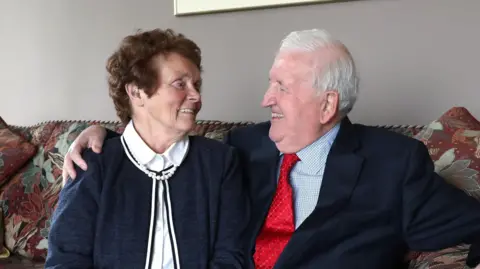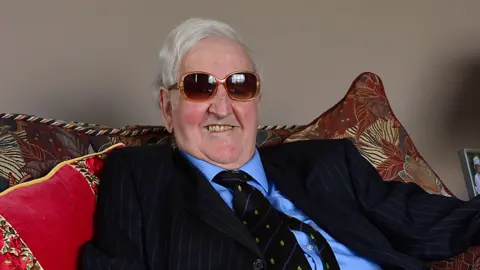A distinguished civil servant who wanted to show leadership
 Pacemaker
PacemakerSir Kenneth Bloomfield was one of the most distinguished civil servants in Northern Ireland's history.
During the 30 years of violence in Northern Ireland, known as the Troubles, he was a key figure behind-the-scenes, trying to ensure public services ran as normally as possible.
His death was announced on Saturday. He was 94.
Sir Kenneth was born in Belfast on 15 April 1931 and he was educated at Royal Belfast Academical Institution (RBAI) and Oxford University.
He entered the Northern Ireland Civil Service in 1952.
Four years later, he was appointed private secretary to the then Stormont finance minister Capt Terence O'Neill.
He rose through the ranks of the civil service and in January 1974 he was given a key role working with the new power-sharing executive, led by Ulster Unionist Party leader Brian Faulkner.
Unionist and nationalist politicians came together to govern for the first time but the cross-community executive collapsed after five months due to hard-line unionist opposition, including a loyalist workers strike.
IRA attack
In 1988, the IRA tried to kill Sir Kenneth at his family home in Crawfordsburn, near Bangor, County Down, in a Semtex bomb attack.
A colleague who was in the civil service at the time remembers how calm Sir Kenneth was after the bombing.
Sir Nigel Hamilton, who also became head of the Northern Ireland Civil Service, said: "Within an hour (of the bombing) he had put out a statement and within a couple of hours he was back in the office, working again.
"He wanted to show leadership.
"He wanted to show that we were all resilient and he wasn't going to be deflected from his public sector service because of what had happened."
 Pacemaker
PacemakerAfter he retired, Sir Kenneth reflected on the downfall of power-sharing in May 1974.
He said: "It was the worst day of my official career of nearly 40 years – it was the worst single day. I could foresee that we were going to be plunged for further decades into a situation when there would be no local hand on the tiller."
He was right. It would take another quarter of a century for power-sharing to return.
In the interim, violence raged in the political vacuum.
An attempt in 1985 by the then UK prime minister Margaret Thatcher to improve the security and political situation by signing an Anglo-Irish Agreement with the Dublin government led to sustained unionist protests.
For civil servants trying to keep public services going, the challenges were huge.
After Sir Kenneth stepped down from his job as head of the Northern Ireland Civil Service in 1991, he took on a wide range of public and private sector roles, including Northern Ireland national governor of the BBC and vice-chair of the National Museum and Galleries.
He was also senator at Queen's University Belfast, the inaugural victims' commissioner and co-commissioner of the Independent Commission for the Location of Victims' Remains.
He also worked outside of Northern Ireland, consulting on issues in Jersey, Israel, Austria, Bangladesh and the Netherlands.
He received honorary doctorates from Queen's University Belfast, Ulster University and the Open University.
'I played by the rules'
Sir Kenneth also wrote a number of books.
In A New Life, published in 2008, he wrote: "I enjoyed access to ministers and the opportunity to make recommendations and suggestions to them.
"They might well decide to do something different as was their prerogative.
"I played the game by the rules, and any disagreement while serving, I kept to myself."
Once he left the civil service, he was more free to speak his mind about politics past and present.
He wrote a book called A Tragedy of Errors: The Government and Misgovernment of Northern Ireland.
When it came to Stormont politics, he was an eyewitness to history, and played his part, in good times and in bad.
